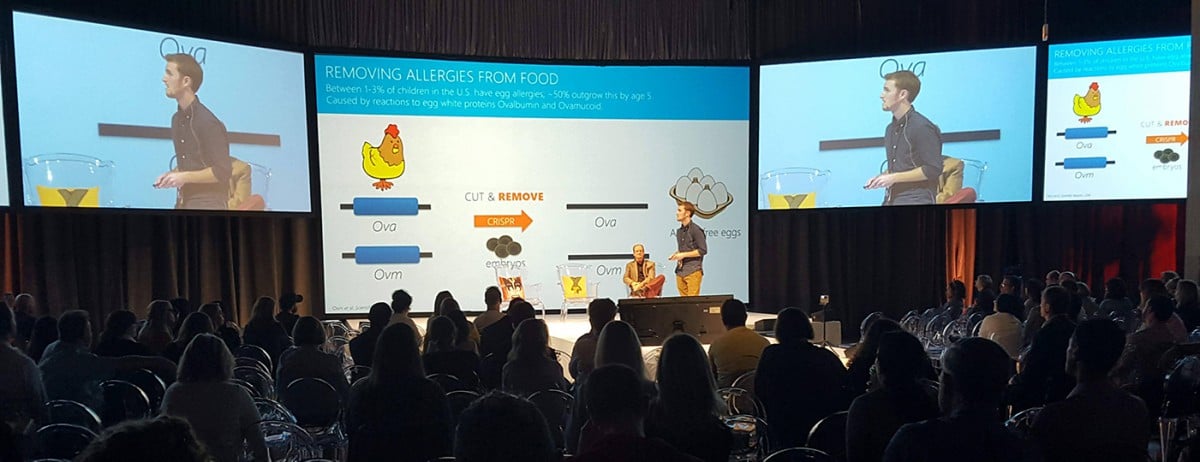Meet GFI Academic Research Advisor Elliot Swartz

GFI Academic Research Advisor Elliot Swartz, Ph.D., has had his eye on the clean meat industry since 2015 when he was working with stem cells for his doctoral research. Fast forward to his current role at GFI: Elliot is furthering research for both clean meat and plant-based meat, assisting startups with the R in R&D, and helping other scientists see the allure of good food.
There is so much opportunity—and need—for scientists in the plant-based and clean meat industries, and the paths from Ph.D. to food system are amazingly diverse. So I wanted to learn what led Elliot from his research in neuromuscular disease to the wonderful world of plant-based and clean meat.
Of all the things you could be doing with your skill set, why do you devote your time to the plant-based and clean meat industries?
In the past decade, it has become increasingly clear to me that the political will to enact change quickly on urgent topics like climate change is limited at best and corrupted at worst. Innovative technologies such as plant-based and clean meat provide a more substantive opportunity to be the change you wish to see in the world. For me, driving this change forward fulfills my ikigai (Japanese term for “a reason for being” ) by bringing my daily intellectual and professional pursuits into alignment with the effort to improve environmental sustainability, human health, and animal welfare by creating a better, more efficient food system.
Another attractive component of plant-based and clean meat research is timing. The other career path I could have chosen was researching therapies for neurodegenerative diseases that currently have no effective treatments. It’s an admirable field, but it is also shrouded in mystery. We’ve begun to scratch at the genetic underpinnings of these diseases, but we still do not understand the mechanisms governing the disease process. In other words, there is a biological black box that still needs to be solved before sizable progress can be made.
Biological black box! Tell me more.
I would argue that there is no biological black box with clean meat. For instance, we’ve already figured out the foundational work on how to turn a stem cell into a skeletal muscle cell or fat cell. So this is the time to start asking the next scientific questions that will enable clean meat development. How can we do this cost-effectively at scale? How can we work with cell lines from new species? How can we replicate the structural and cellular composition of meat? There is an immense need and opportunity for young scientists in fields like cell biology and tissue engineering to apply their skills in finding solutions to these questions. I’m glad I can play some part in that process.
So how did you get here? What is your academic and research background?
I earned my undergraduate degree in behavioral neuroscience at Lehigh University. As part of this, I worked in a variety of labs researching neuropsychiatric disease, aging, and molecular biology. However, it was a summer internship studying microRNA regulation in human embryonic stem cells that proved most formative for me.
This is when I learned about induced pluripotent stem cells (iPSCs)—a technology that can turn adult cells back into their embryonic state. Once they’re in an embryonic state, they can become any number of different kinds of cell. This technology essentially allows us to create muscle cells or fat cells out of stem cells. I figured this advancement would be pivotal in the future of medicine, and I wanted to be involved. I enrolled in UCLA’s neuroscience graduate program to study iPSCs for regenerative medicine and disease modeling.
What first sparked your interest in clean meat?
During my Ph.D. work, I used iPSCs to create skeletal muscle cells. As I mentioned, however, this was in the context of medical research, so I was intrigued when I heard that companies like UPSIDE Foods were using animal stem cells to create meat.
I followed the clean meat industry closely during the rest of my time in graduate school, basically devouring every article and podcast on the subject. Discovering the potential benefits for the environment, human health, and animal welfare made the prospect of a career move into this field all the more attractive.
It was clean meat that drew you to GFI, but what are your thoughts on plant-based meat innovation now that you’re on the job?
It may seem at first glance that plant-based meat technology is figured out. But upon closer inspection, it turns out that the vast majority of plant-based products on the market today comprise only a handful of plant protein types. There are literally thousands of plants that remain to be fully characterized (genetically, compositionally, and functionally), so there’s a phenomenal amount of space for innovation. In many ways, there is as much—or more— opportunity for scientific creativity and innovation to be applied to the plant-based meat field than clean meat. I’m excited to see what people come up with.
YES! Ditto! This is some organization-wide enthusiasm. That’s why GFI launched a competitive grant program to advance critical research for plant-based and clean meat. Check it out!

